
Broken Age (PC, E10+)
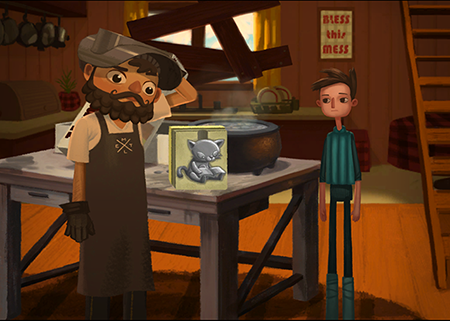
I didn't follow the development of this game so don't expect any thoughts from me on the Kickstarter clusterfuck. The full game's out, I played through both Acts as a whole game, and that's what I'm going to talk about.
How much you get out of this depends on what you want from an adventure game. This is more in line with TellTale's games, so if you grew up on retro point and click adventure games and their moon logic then yes, Broken Age will come across as small and streamlined. There are puzzles, some taxing enough, but the focus is more on the dialogue and keeping the story moving. For both acts I thought Shay had the stronger section, though that might just be because Vella sounds like she's fresh out of a lobotomy operation.
After a fairly strong first act, the second act kind of ruins it with two really lame plot twists. I don't want to spoil them, but one of them completely undermines Shay's situation in the first act, and the other feels like Double Fine was trying to come up with the most needlessly convoluted connection between the two characters' stories. And the latter doesn't even get resolved by the end of the game, unless Double Fine is working on a third act.
Then towards the end it introduces those godawful robot wire puzzles, and the final puzzle which nearly broke all the good will I had built up with the game. You have to keep changing characters and rooms and everything has to be done in an exact order, and you get kicked back to step one every time you get it wrong. Plus, every time it fails two other characters rearrange the robots' aforementioned wires and you have to waste your time putting them back to the way they need to be. That might be why it's hard for me to write much about the game, because all I could think for the last stretch was "Fuck this!"
Rating: 


The Secret Country (Jane Johnson)
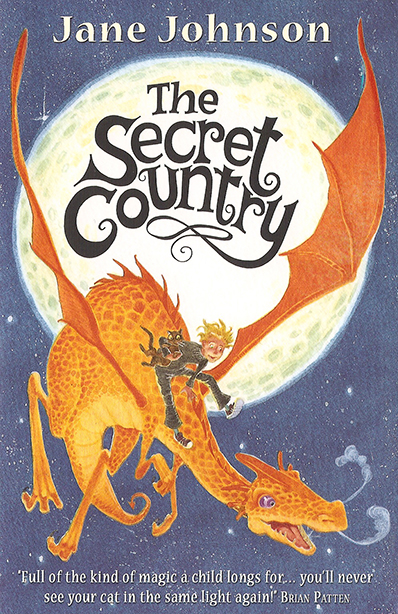
One of the best ways for a book to get in my craw is to populate it with characters who have more luck than brains (I'm looking at you, Harry Potter). The Secret Country is the first in a trilogy of Spiderwick Chronicles knockoffs, about boy who doesn't actually do much and is tossed around by other characters, probably because he knows how badly he'd fuck up if left to himself. In this book's world, you can force another being to do what you want by speaking their true, full name. At one point, Ben commands a dragon by shouting its name within earshot of the Anubis villain, thereby allowing the Anubis to learn the dragon's name and command it. Later, he invokes the name of another character by shouting it out the window of the castle where the Anubis is keeping him prisoner.
Oh, and as well as the cliche "rich evil uncle with a spinster wife and spoiled child" plot point, it's another kid's fantasy book like Magic Zero where one of the villains is a hairless cat. Look, I'll be first to admit that sphynxes aren't as attractive as their fuzzy bretheren, although I might be better disposed towards them than most people. But I can't tell you how tired I am of the "bad guy like cats" cliche, and going for the ugliest cat you can think of is even hackier.
Rating: 

The Familiars: Circle of Heroes (Adam Jay Epstein and Andrew Jacob)
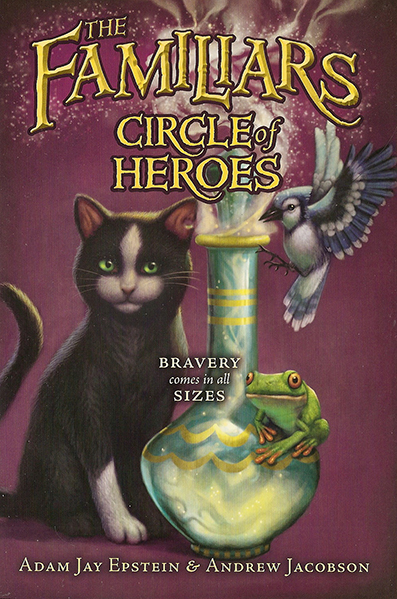
If the first book was basically okay despite missing its own point and the second book was frustrating and pointless, the third book can be described as "tensionless". Our three animal friends are off to round up the seven animals needed to form the titular Circle of Heroes and summon the Shifting Fortress, which they do by heading out and bumbling into them and having the animal say "Yeah, sure, I'll go with you." The only problem is that one of the species they need to complete the Circle is allied with Paksahara. Maybe they find a wolverine that hates the war and is willing to lend its power to stop Paksahara? No, they're all evil. Instead the heroes conveniently discover there's an eighth species that can substitute for any of the other seven, which leads to an even bigger convenience.
So the book contrives other sources of tension. First, they need to get the seven animals before Paksahara's zombies destroy all three of the stones they need to sit around to summon the fortress... you know, considering how easily destroyed the Crown of the Snow Leopard was, and the glyphstones can be shattered by skeletons headbutting them hard enough, the First Phylum really didn't think their security on the Shifting Fortress through. Second, Aldwyn comes upon a note left by their loyals' deceased mentor stating not all prophecies come true so all through the book he's worried that this might be one of them, which is bullshit because there's no way the rabbit is getting her way.
Then Gilbert has a puddle viewing of Skylar impaling him with a magical spear. While Gilbert spends the rest of the book moping about what he could possibly do to make Skylar so angry that she'd kill him, all but the densest reader will quickly realize that either one of the animals in that viewing is actually Paksahara whose magic is shapeshifting, or it's depicting one of Skylar's illusions. Then two of the species needed for the Circle turn out to be bitter rivals... who quickly put aside their ancestral feud to help defeat Paksahara. And when the heroes recruit the aforementioned substitute, one of the others goes apeshit, declaring the Circle of Heroes will never be completed. Oh shit, did the wolverine's belief that humans and animals can never coexist get to him, or was he a saboteur from the start, or... Oh, it was just a cursed relic he had in his messenger bag. False alarm, folks.
One of the animals they recruit is a bloodhound who has the power to see into the past and how things would have changed if different decisions had been made. Aldwyn asks to see what would have happened if Jack hadn't chosen him as his familiar; Jack would have instead chosen a winged snake and Paksahara would have been killed before getting control of the Shifting Fortress, so none of this undead army business would have ever happened. This revelation causes Aldwyn to have a meltdown... for about one chapter. By the end of the book this subplot is forgotten, and Aldwyn doesn't consider the good that came out of the war with Paksahara i.e. the Lightmares coming out of seclusion, the mongooses and king cobras kinda kissing and making up, and the crimes of their ancestors never being revealed to the humans. But there's something pretty massive from the second book the authors forgot: (Would Aldwyn's father still be alive? In the second book the familiars come to a river where time and space is warped, and Gilbert has a puddle viewing depicting Aldwyn in danger and needing the Crown of the Snow Leopard to be saved. Somehow, this viewing travels down the river, winds up three years in the past, and is seen by Aldwyn's father, Baxley. This kicked off his quest to find the Crown of the Snow Leopard, which ended with him turned to glass and shattered by a whackjob. But of course, if the familiars never made the trip to this river or if Aldwyn hadn't been with them, Gilbert never would have had the puddle viewing, Baxley never would have seen it, and he never would have gone looking for the Crown. Additionally, Baxley would have been there Malvern attacked Aldwyn's mother, so would she also have died?)
So yes, the second book was so worthless even the authors seem to have brushed it aside. That book also established that dabbling in necromancy eats away at the life energy of the necromancer, shown in a mage with a disfigured arm and Skylar's health deteriorating just for conjuring the ghost of the beaver who designed the Shifting Fortress. This led me to believe the familiars were going to storm the Shifting Fortress and find Paksahara indistinguishable from her zombie horde, but no, she manages to raise an entire zombie army with no ill effect. (Towards the end of the book there's a gruesome illustration of a zombified Paksahara which I accidentally stumbled upon trying to get a page count, but it's actually showing the result of her falling into her own dead-raising obsidian after getting killed... even though she'd just been killed and had no time to decay?)
If anything nice can be said about this series, the world itself has some interesting locations. This book introduces a forest where the border between the worlds of the living and dead is weak, and the spirits of the dead can appear for only long enough to speak a word or two before vanishing again. Many living come to the forest to hear the words of their lost, and wind up lost themselves trying to hear their dead friends and family's messages. It'd just be nice to see a story that actually does something with these locations.
The series should have ended here, but because this series is no stranger to worthless entries Gilbert pulls the hook for the fourth book out of his ass (which we already knew was going to happen because Aldwyn hasn't found his sister). Will I bother with it? I don't plan to, but there's plenty of worse shit I've subjected myself to.
Rating: 

Magic Zero: Dragon Secrets (Thomas E. Sniegoski and Christopher Golden)
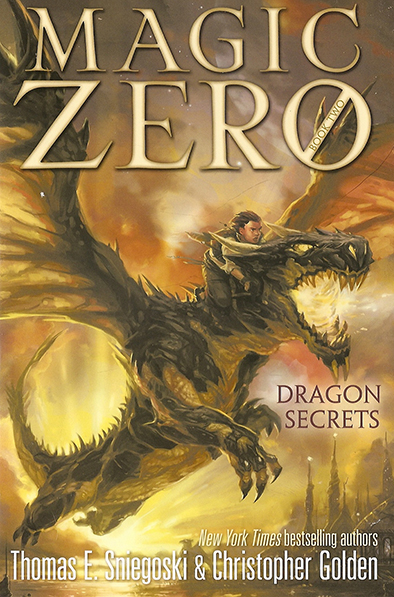
Well, speak of the devil.
I read the remaining three Magic Zero books this month after reading the first one back in March, and as I sit here to write their quickies I'm finding this one the hardest to write about. It's a pretty mediocre series to begin with, but this one is mostly setup for the other two books with a message about how nobody wants to admit when they're wrong because it means they're the bastard thrown in for good measure. So, apologies if this quickie is uninformative and rambly.
Things get off to a flying start when Timothy's dragon friend Verlis gets captured and imprisoned, and when Leander comes to deliver the bad news Timothy loses his shit at him like it's his fault the Parliament of Mages are a bunch of assholes. So Timothy has to come up with a way to enter the underwater prison and bust Verlis out, then help him get back home. Along the way he's harrassed by a Constable whose most intimidating act is in a flashback where he kills his parents by setting their house on fire when they're passed out drunk, but spends the main book whining like a baby. Then we're introduced to Raptus, a malicious Wurm who leads an army that wants vengeance against the Mages for kicking them out of Arcanum, but doesn't really do much here because he's not scheduled to be the primary antagonist until the fourth book. Again, this book doesn't so much tell a story as establish plot points for the next two books.
And this might be petty, but these books do not make it clear how big the Wurms are. They can easily fit in rooms designed for humans and Timothy expected to take Verlis out of Abaddon in a submarine, which makes them sound like human/dragon hybrids. But Verlis is able to carry both Timothy and Ivar, a full grown man, and as you can see the cover depicts Verlis as quite huge.
Rating: 

Tetrobot and Co. (PC)

The sequel to Blocks that Matter, Tetrobot and Co. is still a puzzle game based around manipulating blocks of materials with different properties, only this time your block-carrying robot is airborne and the puzzles are based around throwing the blocks and sticking like-propertied ones together. It works quite well, and it's very satisfying to pour over a puzzle and finally have that "Eureka!" moment. Embarrassingly, there was one puzzle I was stuck on for ages because I was stupendously overthinking it and forgot about using blocks to wedge shutters open.
So the level design is solid, but the game's not programmed as well as it should be. First, it really needs a button to cancel an action (or if it has one, it never tells you what it is). As it is now, if you click on a space, you can't call Psychobot off. And if you click the wrong block from your inventory, it's too easy to accidentally shoot it because you have to drag it back down to your inventory to put it back. I mean, my middle finger is resting on this nice second mouse button that's just going to waste, game. The rewind button can also bug out in nasty ways, normally by leaving visual effects behind (for example, if an action electrified a box, sometimes I would rewind and the box would still have lightning bolts over it, though the box isn't actually electrified anymore) or things not returning to their original positions properly, and it seems that if you take too many actions in a level the rewind button's memory fills up and rewinding will get you kicked back far more than one step. I forget the details, but there was one puzzle that confused me for the longest time because after rewinding a switch didn't reset or an object didn't respawn, and I had to restart the whole level.
Also, when you develop a puzzle game, you need to watch your soundtrack. The game's soundtrack is mostly techno ambience, but there were at least two levels where I had to turn the sound off because the music was so irritating I couldn't think.
Rating: 



Magic Zero: Ghostfire (Thomas E. Sniegoski and Christopher Golden)
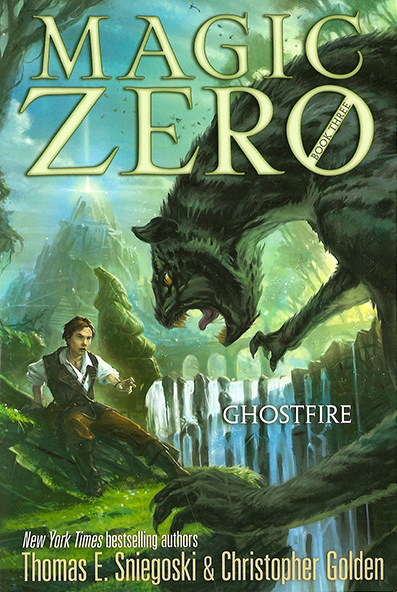
There's an underlying theme to the series where people can only cooperate when there's something even less like them to rally against. Individual Mages plot against each other, unless there's another Guild they can unite against. And the Guilds are constantly feuding, unless there's a species of dragon men and "savages" that they've been told needs banishment. The Wurms and the Asura only set aside their differences when the Mages became hungry for genocide. And everyone, Mage or Wurm*, will forget their grudges when when there's a boy who's immune to magic running around.
Also, please tell me I'm not the only person who thinks this sounds familiar: the big baddy is an evil wizard who tried to take over the wizard world and was opposed by the protagonist's father, and is currently believed to be dead but is actually hiding and slowly regaining power with the help of his lackies, one of which he gave a magic arm to after it got severed. Yes, Alhazred might as as well be called "Lord Tromedlov". The differences are Alhazred played on the Mages' bigotry so they remember him as a hero, and as much as it hates me to defend Harry Potter, at least Voldemort tried to take over the wizard world because he feared death and somehow thought enough power would make him immortal. Alhazred tried to take over the wizard world because he's a dick.
And if Alhazred is Voldemort, then Leander must be Dumbledore, if Dumbledore looked like Ganondorf and spent the series getting tortured, verbally abused, put on trial, nearly executed, stricken by a heart attack, possessed by a literal frog in the throat, and exorcised in time to get his throat unceremoniously ripped out by a werecat. Additionally, Magic Zero continues to stoke my anger when the cat from the first book gets possessed by his dead master and warped into some man-cat abomination. But why is the werecat on the cover drawn with black hair when the cat in the book is a sphynx?
*And maybe the Asura, if they hadn't been all but wiped out by this time.
Rating: 

Hulk Gray (Jeph Leob and Tim Sale, Kindle eBook)
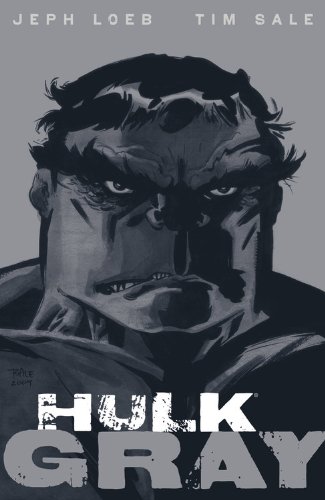
This is a retelling of the creation of the Hulk, framed as a dialogue between Bruce and Doc Samson some time after the Abomination poisoned and killed Betty. It's common knowledge that the Hulk was originally intended to be gray but was turned green because the printers back then were shit (and then the gray Hulk was eventually retconned into a seperate character, except the Gray Hulk is intelligent while the original gray Hulk is... well, the Savage Hulk only gray because comic continuity revels in being impenetrable), but this uses the original gray, mindless Hulk as an allegory for how the world isn't black and white (I see what you did there). Granted, moral ambiguity and humans being the real monsters were already running themes in the series, so I don't think this miniseries is bringing anything new to the table when General Ross nearly turns his daughter into swiss cheese by ordering his men to fire on the Hulk when he has her.
But I really want to rag on the... for lack of a better word, "loose" art style. I suppose it's intended to be nightmarish, but I think it's just ugly. I know that in a world of gamers who value technical bells and whistles over art style it feels vapid to put so much emphasis on the visuals, but in comics the artwork is as much a part of the narrative as the writing. Bruce's drastic transformation and Betty's fear of him was reinforced by how aggressive Dale Keown's Hulk was. Gary Frank drew the Hulk even larger but with softer line work, which reflected that for all his strength and mass he still had a human soul. Tim Sale's Hulk is supposed to be a mindless brute, but he just looks like a gorilla that fell into a tar pit.
I guess I should just be thankful that when the Hulk accidentally crushes an animal's skull it's a jackrabbit instead of a cat. Which still sucks, but I've had my fill of people abusing cats this month.
Rating: 

Mystery Science Theater 3000 Vol. XXX (TV DVD)
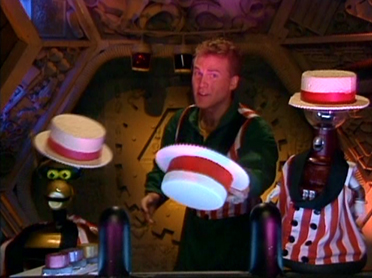
It's MST3K so you know it's good for some laughs, but nothing in this set particularly stands out among other MST3K sets. Admittedly The Black Scorpion is decent for a Season One episode, but it's not brilliant. Outlaw of Gor and The Projected Man were okay, but one is a bog-standard fantasy barbarian film, the other is a bog-standard science project gone awry disaster film (where the first thing the titular Projected Man electrocutes after his creation is a stray cat oh for fuck's sake).
Since this set's Season One episode wound up being alright, It Lives By Night takes it upon itself to fill the set's shit quota, being one of those movies that was so painful even the SOL couldn't help it. It's a horror film where a man gets bitten by a bat and slowly turns into a vampire while being pursued by a cop, and the movie just drags and drags and drags. I spent most of the episode checking the run time, just waiting for the damn thing to end.
Rating: 


Magic Zero: Battle for Arcanum (Thomas E. Sniegoski and Christopher Golden)
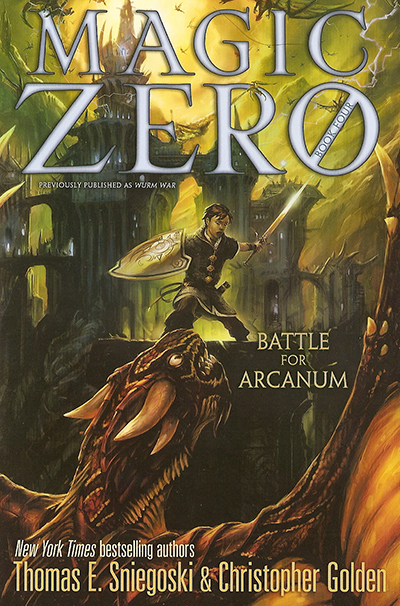
At the end of Book 3 Timothy was able to defeat Alhazred, but the only way he could do that was to disable all the magic in the world for a second or two. This had the unforeseen side effect of breaking the barrier that kept the angry Wurms from Book 2 out of Arcanum (which might sound like a spoiler, but it's given away on the back of this book). In terms of narrative structure, this is like if Harry Potter defeated Voldemort in the sixth book, and the huge battle at Hogwarts where half the cast gets killed was instead against the Dementors.
Additionally, Raptus has been empowered by draconic magic that's swiftly increasing his size and strength through the book, leading up to what's basically a mashup of the fights with Deathwing in World of Warcraft and Kefka in Final Fantasy VI. The thing is, from the outset you know how they're going to beat him, and the more I read the more tired I got of the characters trying to come up with a way to penetrate the magic that makes Raptus invincible. Gee, if only there was somebody among the humans who could negate magic. Oh wait, towards the end Timothy finally explains why he didn't do that sooner, and that's because he'd never get close enough to Raptus to break the enchantment without getting flamethrowered. Except then he totally does.
And maybe the ending was meant to be purposefully ambiguous, but it feels more like an opening for a sequel that never got made because this series didn't catch on with the mainstream. Lending credence to that idea is a handful of plot threads that went unresolved, like the authors thought there'd be more books to explain them in. In the first book, Nicodemus tells Timothy something like "I killed you once before and I can do it again." What did he mean by that? Through the series I thought it was going to lead to an explanation of why Timothy lacks magic i.e. he was killed and resurrected, but no, it never comes up again. And who hired the assassins that came after Timothy? I'm inclined to believe it was Nicodemus himself, so he could dispatch them and make it look like he was Timothy's protector, but we never get a solid answer. And what happened to the people locked up in Abaddon after Timothy killed the world's magic for good?
Rating: 

Thor: The Dark World (PG-13)
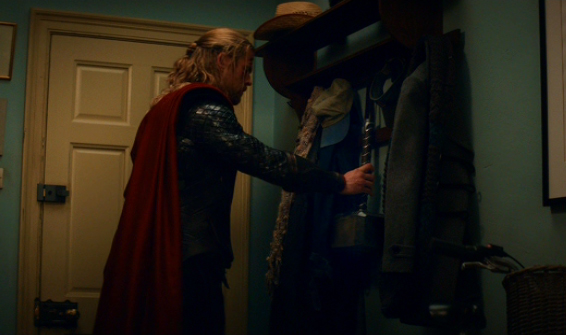
It's a comic movie so some cheese is expected, but boy can Hemsworth get hammy. As in, there where a couple of scenes where it sounded like he was shouting while gnashing on an invisible hunk of pork. And when he really starts chewing somebody out, I kept waiting for him to shout "And your hair is not flowy enough!"
Oh, the movie itself is fine. At least it's better than the Thor comics I read last month.
Rating: 


Guardians of the Galaxy (PG-13)

I guess when James Gunn and Nicole Perlman sat down to write this and saw the characters included a talking raccoon with a love for giant guns, a tree-man that can only say "I am Groot", and a blue muscleman who doesn't know what a figure of speech is, they realized trying to take it seriously was going to be even more of a lost cause than normal with comic book movies. So they went the comedy direction, and it is glorious. The Internet has been raving about it since it hit theaters, so what can I say about it that you haven't already heard? Maybe that it's more accessible to people familiar with the Infinity Gauntlet miniseries.
By the way, was Wreck-It Ralph was supposed to be Richard Rider? Because I can't decide if that would be disappointing or awesome.
Rating: 



The Graveyard Book (Neil Gaiman)

When I play a highly acclaimed game I don't like, I'm confident in my ability to tear it apart. When I read an award-winning book I don't like, I wonder if I missed something. The Graveyard Book starts out with a baby narrowly escaping an assassin by toddling into a graveyard and being adopted by a village of ghosts and a vampire. There's this big mystery hanging over the boy's family and why they were assassinated, but instead of spendings its pages piecing it together the book fannies around for five or six chapters before having a character info dump the answer. And when the secret is revealed ("There was a prophecy that this family would birth a boy that would destroy our ancient cult!") I didn't give a crap because none of this stuff had been mentioned before. So the book comes across Gaiman digging through a box and pulling out toys to keep you occupied until he feels like wrapping the book up. There's a crypt with a blue guy and a voice waiting for its master, how spooky! Oh, and here's some ghouls and a werewolf to wreck their shit! How about a night where the ghosts come into town and dance with the living, and then nobody remembers it!
Then again, it's an award-winning kid's book and doesn't seem to have much ambition beyond imagination fodder. This becomes obvious in the chapter where Bod uses his ghost abilities to terrify some school bullies. It doesn't tie into the rest of the story, it's just wish fulfilment.
Rating: 
